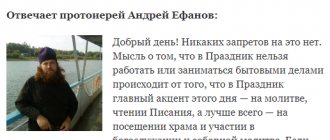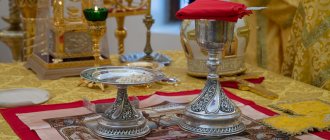Modern clergy on preparation for Holy Communion
Prot.
Valentin Asmus: Of all the gifts given to the priesthood (shepherding, teaching...) the greatest is the sacramental celebration, and above all, the Divine Liturgy. This is a gift given to the Church, to all believers. The priest is not the owner of this gift, but its distributor, responsible before God for ensuring that no one is left out at the “feast of faith.” The most gratifying thing in our church life is the “Eucharistic revival”, predicted by St. Righteous John of Kronstadt. We do not have the right to refuse Christians who wish to partake of the Holy Mysteries of Christ. The only obstacle here is the continuing state of mortal sin.
Communion must be a deep inner need. It is unacceptable to receive communion formally, for external reasons: because Schmemann orders communion every Sunday, or because mother asked, or because everyone is coming... Communion is a personal matter, the most important event in a person’s life. The priest should remind parishioners of the importance of Communion. But there is no need to demand complete uniformity. When the so-called comes to me a “little church” person, I tell him that the indispensable duty of a Christian is annual Communion. To those who have the habit of annual Communion, I say that it would be nice to take communion during all multi-day fasts and on the day of the Angel. To those who go to church regularly and are looking for spiritual guidance, I talk about the desirability of Communion once a month or once every 3 weeks. Who wants more often - maybe every week, and even more often. There are people who strive to receive communion daily. These are lonely, middle-aged, and frail people. I cannot refuse them, although I believe that even they should confess every time.
The norms of fasting and abstinence for each person are determined individually. If a person receives communion once a year, why shouldn’t he fast for a week, as he did before? But if you receive communion every week, you can probably fast for no more than 3 days. That being said, it is difficult to enforce fasting on the Sabbath, remembering how much ink has been spilled to condemn the Latin Sabbath fast. Here the problem of “double morality” arises: clergy do not fast either on Saturday or on other non-fasting days, when they receive communion the next day. Obviously, church order does not require a clergyman to fast before Communion, not because he is “better” than a layman, but because he receives communion more often than a layman.
How to behave on the day of Holy Communion: truth and myths
It is difficult to prescribe to others what you yourself do not do, and it seems that the only healthy way to get rid of the “double morality” is to bring the measure of fasting of frequently communing laity closer to the measure of the clergy, in accordance with this very frequency. The orders of those abbots who solve the problem in the opposite direction, obliging subordinate clergy to abstain from meat for a certain number of days before Communion, have no canonical basis. And regardless of Communion, the measure of fasting varies from person to person. You cannot demand strict fasting from sick people, children, pregnant and nursing mothers. It cannot be demanded from those who are not accustomed to fasting or from those in cramped living conditions: those living in non-believing families, those in the army, in a hospital, in prison. In all these cases, the fast is either softened (and here there is the possibility of multi-degree gradation) or completely canceled.
It is hardly advisable to require abstinence from food and drink from infants up to 7 years of age: the moment of a mystical meeting with Christ, which a child’s soul cannot help but feel, should not be overshadowed and overshadowed by hunger for a child, which is not only painful, but also completely incomprehensible. It happens that a person urgently needs to take medicine: in case of a heart attack, headache, etc. This should in no way be an obstacle to Communion. For those suffering from diabetes, frequent meals are necessary, which also does not deprive them of the right to partake of the Holy Mysteries.
Nowadays, pilgrimage travel has received great development. They are often timed to coincide with major holidays. It can be a pity when a Christian cannot take communion on a holiday because he could not observe the full form of fasting along the way. In such cases, relaxation is also necessary. There is also the problem of marital fasting. This is a sensitive area, and parishioners should probably not be questioned on this topic. If they themselves want to fulfill all the rules, they need to be reminded of the words of the Apostle of Languages that spouses should fast only by mutual consent. If one of the spouses is a non-believer, or even if they are on different spiritual levels, both being Orthodox, imposing abstinence on the less spiritual spouse can have very dire consequences. And if a married believer wants to receive communion, the incontinence of his husband or wife should not be an obstacle to receiving communion.
Another problem is prayerful preparation for Communion. Let us remember that in our liturgical books a distinction is made between literate and illiterate, and the latter are allowed not only all cell rules, but even church services (vespers, matins...) to replace the Jesus Prayer. In our time, there seem to be no illiterate people, but there are people who are just beginning to master church books. Modern man is immersed in the whirlwind of worldly vanity much more than he was 300 years ago. Many modern people find it difficult to read the monastic rule: three canons and an akathist. It is advisable to require the reading of the Sequence for Communion or at least 10 prayers from it. Otherwise, the parishioner begins to conscientiously read the 3 canons, but due to lack of time, never gets to the Follow-up. But if a person has not had time to read the Follow-up, but sincerely wants to take communion, it is difficult to refuse him.
It is not always easy for everyone to be at Divine Services on the eve of Communion. It is unlikely that anyone will demand this from an old woman who only gathers the strength to go to church and take communion a few times a year. But it is also difficult for the evening shift worker and the mother of small children. In general, these days it is difficult to require everyone to attend the evening service on the eve of Communion, although, of course, this should be encouraged and welcomed.
The practice of confession before each Communion generally justifies itself. This requires, with frequent Communion of parishioners, a lot of effort from the priests. Unfortunately, in some cases this turns into the fact that the priest, in order to make his life easier, prevents his parishioners from receiving frequent Communion, limiting Communion to Lenten periods, preventing communion on Easter and other holidays, although the church canon (66th of the VI Ecumenical Council) prescribes take communion every day of Bright Week (fasting, of course, is out of the question in this case). Easter and Christmas are holidays when many “non-church” people come to church. It is our duty to give them all possible attention on such days. Therefore, parishioners need to confess the day before, say, in the first 3 days of Holy Week. Of course, someone who has confessed and received communion on Holy Thursday can also receive communion on Easter. Generally speaking, Communion on Easter is a gratifying achievement of our church life in recent decades. But, unfortunately, this achievement is not universal. Some abbots do not give communion to the people at all on Easter (probably so as not to overwork), while others agree to give communion only to those who have regularly fasted throughout the Holy Pentecost. In this case, reading the Easter word of St. John Chrysostom, where those who fasted and those who did not fast are called to Communion, turns into an empty and hypocritical formality. Easter is the day when many of our contemporaries come to church for the first time. We must do everything in our power to ensure that these people meet Christ. They must be confessed if they want, and perhaps also given communion. Undoubtedly, the elimination of “general confession” in our days is positive. However, if a parishioner well known to the priest comes up to the lectern and says that he wants to receive communion, the priest can probably limit himself to reading a prayer of permission.
It is impossible to deny the importance of penance in the spiritual rebirth of man. In some cases, excommunication from Communion for a certain period may be applied. In modern conditions, this period should not be long. At the same time, some self-proclaimed elders practice annual or even two-year excommunication not only from Communion, but also from visiting church. In our time, this leads to the de-churching of people who, before this unfortunate penance, had already become accustomed to regularly attending Divine services.
In conclusion, I would like to quote from St. John Chrysostom, answering the much discussed question in our time about the frequency of Communion. As we see from these words of the saint, in his time different practices of Communion collided: some took communion very often, and others once or twice a year (and not only hermits and hermits). “Many partake of this Sacrifice once throughout the year, others twice, and others several times. Our words apply to everyone, not only to those present here, but also to those in the desert - because they receive communion once a year, and sometimes even after two years. What? Who should we approve? Are those who receive communion once, or those who often, or those who rarely? Neither one nor the other, nor the third, but those who partake with a clear conscience, with a pure heart, with an impeccable life. Let such people always begin; and not like that - not once... I say this not to forbid you to begin once a year, but rather to want you to continually approach the Holy Mysteries” (PST, vol. 12, book I, Moscow, 2004, p. 153-154). Thus, the saint does not declare formally obligatory one of the practices of Communion that existed in his time, as some currently fashionable doctrines do, but establishes an internal, spiritual criterion.
Archimandrite Raphael (Karelin):
Already Theophan the Recluse, in a letter to one of his spiritual daughters, wrote that irregularities had crept into parish life, and as the most dangerous example of such irregularities he cited the vicious practice of priests who prevent Christians from frequently receiving communion. The reason why this is done, first of all, is personal lack of spirituality, when the priest himself does not feel the inner need to receive communion as often as possible, and looks at communion as his professional duty. The second reason is theological ignorance and reluctance to become acquainted with the unanimous teaching of the holy fathers on frequent communion as the Heavenly Bread necessary for the human soul. The third reason is laziness and the desire to reduce the time needed for confession and communion. There is another reason: this is a false, Pharisaic reverence. The Pharisees, in order to show their special respect for the name of God - Jehovah, forbade saying it at all. Thus, they distorted the commandment: “You shall not take the name of your Lord in vain (in vain).” The liturgy itself is a divine service during which the sacrament of the transubstantiation of the Holy Gifts is performed and the sacrament is given to the people. When the liturgy is served, then you can receive communion. In liturgical prayers, the Church calls on everyone in the church to accept the Body and Blood of Christ (of course, if they have prepared for this). During Easter week and Christmastide, and in the several weeks preceding Great and Petrine Lents, one can without a doubt receive communion, since otherwise the Church would not serve the liturgy on these days. The life of St. Macarius the Great tells how a priest, who arbitrarily excluded people from communion, was severely punished with many years of paralysis, and was healed only through the prayers of the saint. Macaria. St. John of Kronstadt especially sharply denounced this vicious practice of communion. On Bright Week, before communion, it is enough to abstain from meat food, but it is better to agree on this issue with your confessor. Archpriest Belotsvetov wrote in a well-known collection of his sermons that in his time Christians tried to take communion on Bright Week every day.
Hegumen of the Athos monastery of Vatopedi, Archimandrite Ephraim
The practice of Confession and Communion and the prayer rule before Communion
Some monks go to confession every day.
Communion in Vatopedi occurs 4 times a week: Tuesday, Thursday, Saturday and Sunday. On other days, strict fasting is observed (without oil), on Saturday - food with oil. In total, there are up to 10 liturgies a day in the monastery, so there is a distribution of monks when to receive communion. Confession in the Greek Church is not connected with Communion. A person who has not committed mortal unforgivable sins has no obstacle to Communion. Communion is from the love of the heart, it is the desire of the heart. The prayer rule before Communion in Greece is Follow-up to Communion. There are canons, but their reading should not be legitimized. There can be no coercion in the matter of preparation. The same applies to fasting. Whoever observes all the fasts prescribed by the Church has fulfilled his duty, but there is no rule prohibiting Communion to someone who has not fasted.
(Questions asked to Abbot Ephraim at his meeting with students of Moscow theological schools, and his answers)
Prot. Dimitry Smirnov:
It seems to me that it is necessary to include such a chapter as “medicines” in the communion memo. Because so many priests consider medicine to be food. Nitroglycerin, medications for diabetes - all this is food, i.e. fall into a coma, but don’t put it in your mouth. Therefore, it is necessary to indicate somewhere that medicine is not food. Just like drinking medicine with milk is not a violation of fasting.
The canons of the Orthodox Church prescribe Communion on Holy Week. I once proposed such a scheme. Whoever receives communion once a year must fast throughout Lent. Those. fast for a month and take communion somewhere at the end of the fast. Whoever receives communion once during Lent fasts for a week. Whoever receives communion once a month gets three days. For those who take communion once a week, it is Wednesday and Friday, and on Saturday there is still no meat.
(Speech by Archpriest Dimitry Smirnov, Chairman of the Synodal Department for Interaction with the Armed Forces and Law Enforcement Organizations of the Moscow Patriarchate, rector of the Church of St. Mitrophan of Voronezh on Khutorskaya at the round table “Preparation for Holy Communion: historical practice and modern approaches to resolving the issue” December 27, 2006 )
Prot. Vladimir Vorobyov:
Our community practices a simplified way of preparing for Holy Communion. For those who live a deep Christian life, pray to God, regularly go to church, observe fasting days and annual fasts, in order to receive communion on Sunday you need to fast on Wednesday and Friday, and not eat meat on Saturday, you need to read the following to the saint Communion. We do not require reading all the canons.
…In our community it has long been accepted that a family should live a natural life: a family should have as many children as God gives. We do not bless any birth control measures. We have a lot of large families in our parish: about 400 children receive communion on Sundays; We have many families with seven or eight children; There are families with nine children, even twelve. Parents in such families live an ascetic life.
Demand that a mother of many children, who devotes her entire life to her feat, read all the canons and akathists, and if not, then not allow her to take Communion... It seems to me that an individual approach, a feasible rule, is needed here.
If a person lives a zealous life, wants to receive communion more often, his soul demands to be with Christ, in the Church, then we often allow him to receive communion every week. The Scripture says: “Do not quench the Spirit!” (Thess. 5:19). Why are we going to extinguish it? On the other hand, in the parish there is, of course, a very serious problem with people who have come to the Church recently, who have not freed themselves from their passions and sinful habits, and who know little. They may want to arrange their life in a Christian way, but in such a way that everything is possible. The confessor must know such people, and a certain severity and caution must be shown towards such people. Because for them very frequent Communion becomes formal, they lose reverence. This is not love for Christ, but simply an easy way to live a new life. Or they treat Communion as a medicine: “I don’t feel well, but if I take Communion, it will be easier for me.” This is a magical approach. And the priest must understand all this, feel, know and limit such people.
After all, Communion can also be a condemnation...
It is imperative to keep the blessing for Communion. And our people know that without a blessing for Communion it is impossible to receive communion.
A priest, if he has a community, knows who he can admit to Communion and who he cannot. We must return to this practice. The priest is responsible for his spiritual children, and if he has a community, then he taught it that it is impossible to receive communion with mortal sins, without fasting, without preparation...
Hieromonk Job (Gumerov), resident of Sretensky Monastery, Candidate of Philosophical Sciences, Candidate of Theology:
It is necessary to strictly ensure that one does not receive communion unworthily, but to avoid the other extreme: refusing regular participation in this great sacrament under the pretext of unworthiness. The Monk John Cassian the Roman speaks about such people: “Although we know that we are not without sin, we must not shy away from Holy Communion... And whoever is purer in spirit sees himself all the more unclean, and finds reasons for humility rather than exaltation.” ... We should not avoid Communion of the Lord because we recognize ourselves as sinners, but we must rush to it with even more and more thirst for the healing of the soul and the purification of the spirit, however, with such humility of spirit and faith that, considering ourselves unworthy receiving such grace, we desired more healing for our wounds. Otherwise, even once a year one cannot worthily receive Communion, as some do, who, living in monasteries, evaluate the dignity, sanctification and beneficence of the heavenly sacraments in such a way that they think that only saints and immaculates should receive them. But it would be better to think that these sacraments, through the communication of grace, make us pure and holy.” The Church allows our Christian conscience to test our readiness for Communion. The blessing for Communion is given by the priest who receives confession.
Prot. Alexy Uminsky:
I encourage frequent communion, but I do not make it an obligation on anyone, so as not to limit the spirit of freedom. Beginners are no exception here. For regular parishioners, special fasts other than regular ones are not recommended; I don’t even encourage you to exclude meat on Saturday - it’s better not to watch TV.
When using the site materials reference to the source is required
IS IT POSSIBLE TO RECEIVE COMMUNION DURING A SOLID WEEK?
The Week of the Publican and the Pharisee, which begins the preparation for Lent, is followed by a continuous week. In this regard, many parishioners have a question: how to receive communion these days, since preparation for receiving the Holy Mysteries of Christ includes, among other things, bodily fasting? Should one dare to approach the Chalice without fasting, or, conversely, should one fast as usual and at the same time ignore the provisions of the church charter, which stipulate that during the entire week there will be no fasting even on Wednesday and Friday? Or maybe you shouldn’t start communion at all during this period?
For clarification of this difficult point, our site turned to several respected and authoritative clergy. They were asked to answer two questions: is it possible to receive communion during the whole week and on the following Sunday? If so, how should one prepare for communion on these days?
Archimandrite Porfiry (Shutov), Abbot of the Solovetsky Stavropegic Monastery:
– In understanding this issue, we need to separate the abundance of pastoral practices and private opinions that may exist, and the requirements of the charter. There is a limit for private theological opinions and pastoral practices, and in this case it is that the Liturgy is celebrated on this day, which means that the Church blesses the communion of the faithful.
In my life I have had the opportunity to meet priests who are convinced that communion cannot be given on continuous weeks, and categorically deny this to believers. I had to see how painful this was often for people.
And it’s clear why, because they can be in different spiritual and mental states. For example, there is a period of some special sorrow for a person when he naturally fasts, therefore there will be no sin if during the continuous week he, due to the state of his soul and body, does not eat the sacramental food, but according to the disposition of his soul, he is directed towards communion and seeks Christ's help in difficult circumstances. Therefore, it is possible, necessary and necessary to receive communion in such cases, and the Church, as a loving Mother, in no case rejects her children from this strengthening - the greatest that she can give - through the communion of the Holy Body and Blood of Christ.
The wise church charter knows continuous weeks. At the same time, this does not mean that you can not prepare for communion during this period by fasting and prayer. During continuous weeks, as always, preparation for communion is necessary, but specific questions must be left to the discretion of the shepherd and his spiritual child: for example, name days can happen during this period - how can a believer fast in order to receive communion with dignity? When considering such issues, there are many individual, private circumstances that need to be taken into account.
Well, in general, if there is a relaxation of fasting and, in particular, its complete abolition on Wednesday and Friday during the continuous week, then it seems that a certain relaxation in this part of the preparation can be provided for. This is a matter of individual spiritual judgment between the shepherd and the flock.
Deputy Chairman of the Department for External Church Relations of the Moscow Patriarchate, rector of the Moscow Church of the Resurrection on the Assumption Enemy, Archpriest Nikolai Balashov:
- Of course, you can take communion. On those days when you cannot receive communion and the Liturgy is not served, for example, on Good Friday during Holy Week.
Preparation for communion during the whole week depends on the person and how often he receives communion. I think that for those who receive communion often—say, every week—it is enough to observe the established fasts. This rule is basically followed by the clergy. How do you impose burdens on others that you yourself do not bear? I think this is bad and wrong. But for those who receive communion very rarely - say, once a year or even less often - and for some reason need the Sacrament precisely on these days, I would probably advise fasting for at least a few days, even though the week is continuous .
The main preparation, of course, is not in the diet, but in the examination of conscience, in the thirst for another life: “Let a man examine himself, and in this way let him eat of this bread and drink of this cup” (1 Cor. 11:28).
First Deputy Chairman of the Educational Committee of the Russian Orthodox Church, Rector of the Patriarchal Metochion
-
Church of St. Seraphim of Sarov on Krasnopresnenskaya Embankment in Moscow, Archpriest Maxim Kozlov:
- There is no Divine Liturgy during which believers cannot partake of the Holy Mysteries of Christ. And in this sense, no continuous week is a period when an Orthodox person should not take communion if he has the urge and desire to do so.
Regarding the question of whether one should fast before communion during the whole week, then, guided by the spirit and letter of the Typikon, it should be noted that to establish a fast for oneself at a time when the Church abolishes it means, at a minimum, to be arbitrary and impose burdens , which do not need to be imposed.
From the point of view of external preparation for communion, everything is simple: during the whole week, eat what is allowed, that is, modest, but do not give yourself a feast “from the belly” on the eve of communion. After all, it is clear that even on a fast day you can eat three kilograms of fried potatoes until you then suffer from indigestion; this also will not be a proper way of preparing for the reception of the Holy Mysteries of Christ. Moreover, you should refrain from inappropriate drinking of alcohol.
What obstacles may arise for those wishing to receive communion during the continuous week? From my point of view, there can only be one obstacle: it is unacceptable for someone to begin the Holy Mysteries who deliberately and slyly puts off communion for a whole week so as not to prepare for it. Suppose a person takes communion three or four times a year, and instead of waiting for Lent, talking, getting together, he says: “I’ll take communion during the whole week after the Week of the Publican and the Pharisee, on Maslenitsa and on Bright Week - that’s possible.” will not fast before receiving the Holy Mysteries.” It is clear that if the idea of communion during this period is not aspiration to Christ, but an escape from fasting, then a person who is guided by such thoughts is acting craftily; he can be advised, for the benefit of his spiritual and physical health, to think about himself and not take communion for now.
Deputy Chairman of the Synodal Department for Youth Affairs, Abbot of the Vysoko-Petrovsky Stavropegic Monastery in Moscow, Abbot Isidor (Tupikin):
– It is not only possible, but also necessary to receive communion during the continuous week. The celebration of the Divine Liturgy by a priest presupposes the communion of those present.
What about fasting before communion? If we are talking about the so-called “practicing” believers (who often take communion and understand the meaning of fasting), then with the individual blessing of the confessor it is possible to receive communion without fasting for many days - it will be enough just to abstain from fasting food and other pleasures the day before.
Participation in the Sacrament of Confession before communion, heartfelt repentance and awareness of our unworthiness before God opens up for us the opportunity to receive communion not only during the week of the Week of the Publican and the Pharisee, but also on Bright Week and Christmastide.
Associate Professor of the Moscow Theological Academy, editor-in-chief of the scientific theological portal “Bogoslov.ru” Archpriest Pavel Velikanov:
– Can there be such a situation in the Church that the Divine Liturgy is served “for no one”? After all, the priest does not serve for himself: “What is Yours from Yours is offered to You ABOUT EVERYONE AND FOR EVERYTHING.” Of course, you can take communion during the whole week, and it is especially useful on the eve of Great Lent, in order to protect yourself from opinions about the significance of our “deeds.” The All-Wise Church calls us to minimize all our exploits - even those usually performed in preparation for communion - and to boldly approach the Chalice, but not with an arrogant feeling - “and in this I am completely obedient to the Church!” - and with the opposite feeling of one’s own lewdness, with a heightened sense of need for God - exactly the same as the publican had.
The issue of preparing for communion requires an individual approach, but in general, as it seems to me, during this week it makes sense to preserve only that essential minimum, without which it would be simply arrogance to dare to approach the Chalice - namely, to preserve the prayerful reading of the Rule for Communion, without three canons and akathist - just as it happens on Bright Week. Only on Easter are we filled with the grace of the Risen Christ, but here we degrade ourselves to the extreme, not observing fasting, limiting ourselves not only in the choice of food, but in its quantity. After all, you can get up with a slight feeling of hunger even from the table with quick dishes.
And it is also very good, as a preparation for a meeting with the Seeker of the heart, to finally take and do that very good deed that has been put “on the back burner” for so long. And, having done it, do not think about yourself, but consider this act to be nothing more than the return of an old debt. And, bowing your eyes downwards, go towards Christ - to the Chalice with His Body and Blood.
Prepared by the editors of the website Hramilii.ru
FAQ
POSTS
(here are the general rules for permanent parishioners of our Temple;
the extent of fasting must be determined with the confessor)
All year round, Wed and Fri are fast days, except for continuous weeks (Food with vegetable oil and fish.). They were installed as a sign that Christ was betrayed by Judas on Wednesday and crucified on Friday.
The fasting day starts from 00.00 o'clock until 00.00 the next day. But according to tradition, it is not customary to eat food until the end of the Liturgy, or at least before reading the morning prayers and drinking holy water and antidor, i.e. Fasting on Wednesday and Friday is allowed (stopped) on Thursday morning. and Sat. respectively.
During fasting and special fasting days we do not eat meat, fish and seafood (equated to fish), eggs, milk and all products containing them.
When food without oil is prescribed, this means that we do not eat fish. If fish is allowed, then butter is also allowed.
CHRISTMAS (FILIPPOV)
(from November 28 to January 6)
- Mon, Tue, Thu - fish, if there is polyeleos (i.e. the calendar says “morning.”)
- Sat, Sun – fish
- other days - with vegetable oil without fish
- from January 2 (right John of Kronstadt) until the end of Lent - no fish.
- On Rozhdestvensky ( January 6 ) and Epiphany ( January 18 ) Christmas Eves we “fast until the first star” - we do not eat food until approximately 16.00, after that we eat food without oil (for those who are preparing to receive communion on Christmas night from 18-00 - do not eat or not to drink).
GREAT
(lasts 7 weeks from Forgiveness Sunday (Maslenitsa) to Easter)
- preparation for Lent - Cheese seditsa (Maslenitsa) - we do not eat meat
- Wed, Fri - no oil
- Mon, Tue, Thu, Sat, Sun - with vegetable oil ( except for the 1st, 4th (Worship of the Cross), and last (Holy) weeks - without oil (on weekdays)).
- abstinence from alcohol, except Saturday, Sunday and the holidays of the Annunciation, Palm Sunday and Holy Saturday.
- Annunciation and Palm Sunday are all fish.
- Lazareva sb - fish caviar.
- Maundy Thursday - vegetable oil.
- Good Friday - complete abstinence from food (according to the Typikon). For the weak and sick after sunset - bread and water.
- Great Saturday - without oil until 18.00 (18.00 - for those who will receive Communion on Easter night).
PETROV
(begins a week after the Holy Trinity and continues until July 12 - St. Peter and Paul)
- Mon, Tue, Thu - fish, if there is polyeleos (i.e. the calendar says “morning.”)
- Sat, Sun – fish
- Nativity of John the Baptist - fish
- other days - with vegetable oil without fish
USPENSKY
(from 14 to 27 August)
- Mon, Tue, Thu, Sat, Sun - with vegetable oil
- Wed, Fri - no oil
- Transformation is a fish.
SPECIFIC DAYS OF STRICT FAST
- Christmas Eve and Epiphany Eve (how to fast, see above)
- Beheading of John the Baptist - September 11 - food with vegetable oil.
- Exaltation of the Holy Cross - September 27 - food with vegetable oil.
CONTINUOUS WEEKS
(mean the absence of fasting on Wednesday and Friday as a relaxation before a multi-day fast or as a rest after it):
- Christmas time - from January 7 to January 18 (11 days), from Christmas to Epiphany.
- The Publican and the Pharisee - two weeks before Great Lent.
- Cheese (Maslenitsa) - the week before Lent (eggs, fish and dairy are allowed throughout the week, but without meat).
- Bright is the week after Easter.
- Trinity - the week after Trinity (the week before Peter's Lent).
SPECIAL POSTS
- fasting for apples and grapes - from June 1 until the Transfiguration of the Lord (August 19) - we do not eat apples and grapes from the new harvest
PARTICIPLE
General rules (you must consult your confessor about the frequency of Communion):
- families can receive communion once every 2 weeks,
- non-family optional - once a week,
- in addition to this - on twelve and great holidays, birthdays, name days, days of especially revered saints and temple holidays.
Fasting * : 1 day before the day of Communion
(for example, Communion on Sunday: we do not eat meat all day (Saturday), and from 18-00 - fast foods (eggs, milk and products containing them), we do not eat or drink from 00.00 on the day of Communion (Sunday)).
Before Communion, read the Follow-up to Holy Communion at home (see in the prayer book). Afterwards, listen in the Temple or pray Prayers of Thanksgiving on your own (see in the prayer book).
*This rule of preparation applies to parishioners of our Temple who regularly receive communion (according to the schedule indicated above), therefore, it is also necessary to consult with your confessor about preparing for Communion.
General rules about bowing and the sign of the cross can be found on the website https://www.molitvoslov.com/text148.htm
HOW TO PREPARE FOR COMMUNION
The days of fasting usually last a week, in extreme cases - three days. Fasting is prescribed on these days. Meal food is excluded from the diet - meat, dairy products, eggs, and on days of strict fasting - fish. Spouses refrain from physical intimacy. The family refuses entertainment and watching television. If circumstances permit, you should attend church services on these days. The morning and evening prayer rules are followed more diligently, with the addition of the reading of the Penitential Canon.
Regardless of when the Sacrament of Confession is celebrated in the church - in the evening or in the morning, it is necessary to attend the evening service on the eve of communion.
In the evening, before reading prayers for bedtime, three canons are read: Repentance to our Lord Jesus Christ, Mother of God, Guardian Angel. You can read each canon separately, or use prayer books where these three canons are combined. Then the canon for Holy Communion is read before the prayers for Holy Communion, which are read in the morning. For those who find it difficult to perform such a prayer rule in one day, take the priest’s blessing to read three canons in advance during the days of fasting.
It is quite difficult for children to follow all the prayer rules for preparing for communion. Parents, together with their confessor, need to choose the optimal number of prayers that the child can handle, then gradually increase the number of necessary prayers needed to prepare for communion, up to the full prayer rule for Holy Communion.
For some, it is very difficult to read the necessary canons and prayers. For this reason, others do not confess or receive communion for years. Many people confuse preparation for confession (which does not require such a large volume of prayers read) and preparation for communion. Such people can be recommended to begin the Sacraments of Confession and Communion in stages. First, you need to properly prepare for confession and, when confessing your sins, ask your confessor for advice. We need to pray to the Lord to help us overcome difficulties and give us strength to adequately prepare for the Sacrament of Communion.
Since it is customary to begin the Sacrament of Communion on an empty stomach, from twelve o’clock at night they no longer eat or drink (smokers do not smoke). The exception is infants (children under seven years of age). But children from a certain age (starting from 5-6 years, and if possible earlier) must be accustomed to the existing rule.
In the morning, they also don’t eat or drink anything and, of course, don’t smoke, you can only brush your teeth. After reading the morning prayers, prayers for Holy Communion are read. If reading prayers for Holy Communion in the morning is difficult, then you need to take a blessing from the priest to read them the evening before. If confession is performed in the church in the morning, you must arrive on time, before confession begins. If confession was made the night before, then the person confessing comes to the beginning of the service and prays with everyone.
Sacrament of Communion
Communion of the Holy Mysteries of Christ is a Sacrament established by the Savior Himself during the Last Supper: “Jesus took bread and, blessing it, broke it and, giving it to the disciples, said: Take, eat: this is My Body. And taking the cup and giving thanks, he gave it to them and said, “Drink from it, all of you, for this is My Blood of the New Testament, which is shed for many for the remission of sins” (Gospel of Matthew, chapter 26, verses 26-28).
During the Divine Liturgy, the Sacrament of the Holy Eucharist is performed - bread and wine are mysteriously transformed into the Body and Blood of Christ and the participants, receiving Them during Communion, mysteriously, incomprehensible to the human mind, are united with Christ Himself, since He is all contained in each Particle of the Sacrament .
Communion of the Holy Mysteries of Christ is necessary to enter eternal life. The Savior Himself speaks about this: “Truly, truly, I say to you, unless you eat the Flesh of the Son of Man and drink His Blood, you will not have life in you. He who eats My Flesh and drinks My Blood has eternal life, and I will raise him up on the last day...” (Gospel of John, chapter 6, verses 53 - 54).
The Sacrament of Communion is incomprehensibly great, and therefore requires preliminary cleansing by the Sacrament of Repentance; the only exception is infants under seven years of age, who receive communion without the preparation required for the laity. Women need to wipe off lipstick from their lips. Women should not receive communion during the period of monthly cleansing. Women after childbirth are allowed to take communion only after the cleansing prayer of the fortieth day is read over them.
When the priest comes out with the Holy Gifts, the communicants make one prostration (if it’s a weekday) or a bow (if it’s a Sunday or holiday) and listen carefully to the words of the prayers read by the priest, repeating them to themselves.
How does communion take place in the Church?
After reading the prayers, the communicants, folding their hands crosswise on their chests (right over left), decorously, without crowding, in deep humility approach the Holy Chalice. A pious custom has developed to let children go first to the Chalice, then men come up, and then women. You should not be baptized at the Chalice, so as not to accidentally touch it. Having said his name out loud, the communicant, with his lips open, accepts the Holy Gifts - the Body and Blood of Christ. After communion, the deacon or sexton wipes the communicant’s mouth with a special cloth, after which he kisses the edge of the Holy Chalice and goes to a special table, where he takes the drink (warmth) and eats a piece of prosphora. This is done so that not a single particle of the Body of Christ remains in the mouth. Without accepting the warmth, you cannot venerate either the icons, the Cross, or the Gospel.
After receiving the warmth, the communicants do not leave the church and pray with everyone until the end of the service. After the emptiness (the final words of the service), the communicants approach the Cross and listen carefully to the prayers of thanksgiving after Holy Communion. After listening to the prayers, the communicants ceremoniously disperse, trying to preserve the purity of their souls, cleansed of sins, for as long as possible, without wasting time on empty talk and deeds that are not good for the soul. On the day after communion of the Holy Mysteries, bows to the ground are not made, and when the priest gives a blessing, they are not applied to the hand. You can only venerate icons, the Cross and the Gospel. The rest of the day must be spent piously: avoid verbosity (it is better to remain silent in general), watch TV, exclude marital intimacy, it is advisable for smokers to abstain from smoking.
It is advisable to read prayers of thanksgiving at home after Holy Communion. It is a prejudice that you cannot shake hands on the day of communion. Under no circumstances should you receive communion several times in one day.
In cases of illness and infirmity, you can receive communion at home. For this purpose, a priest is invited to the house. Depending on his condition, the sick person is adequately prepared for confession and communion. In any case, he can receive communion only on an empty stomach (with the exception of dying people). Children under seven years of age do not receive communion at home, since they, unlike adults, can only receive communion with the Blood of Christ, and the reserve Gifts with which the priest administers communion at home contain only particles of the Body of Christ, saturated with His Blood. For the same reason, infants do not receive communion at the Liturgy of the Presanctified Gifts, celebrated on weekdays during Great Lent.
Each Christian either himself determines the time when he needs to confess and receive communion, or does this with the blessing of his spiritual father. There is a pious custom of receiving communion at least five times a year - on each of the four multi-day fasts and on the day of your Angel (the day of remembrance of the saint whose name you bear).
How often it is necessary to receive communion is given by the pious advice of the Monk Nicodemus the Holy Mountain: “True communicants are always, following Communion, in a tactile state of grace. The heart then tastes the Lord spiritually.
But just as we are constrained in body and surrounded by external affairs and relationships in which we must take part for a long time, the spiritual taste of the Lord, due to the splitting of our attention and feelings, is weakened day by day, obscured and hidden...
Therefore, zealots, sensing its impoverishment, hasten to restore it in strength, and when they restore it, they feel that they are tasting the Lord again.”
Back to list
On what days of Holy Week can you receive communion?
Holy Week is special in Lent and occupies its own special place. This week, or week, is dedicated to the last days of the Savior’s stay on Earth, betrayal and His suffering.
Almost every day of this week is marked by its own event. Therefore, each day is called Great - Great Monday, Great Tuesday, etc.
Almost every day of this week a Liturgy is served, during which you can receive the sacrament of Communion. Liturgy is not held only on Good Friday. This is a particularly strict day on which Jesus Christ was crucified.
Since during the Liturgy a Bloodless Sacrifice is performed, and the Lord himself offers himself as such a Sacrifice, celebrating the Liturgy on Good Friday would simply be inappropriate.
The only exception can be the Feast of the Annunciation if it falls on Good Friday. Then the Liturgy is celebrated. The rest of the time - no.
You can receive communion during Holy Week every day except Friday.











